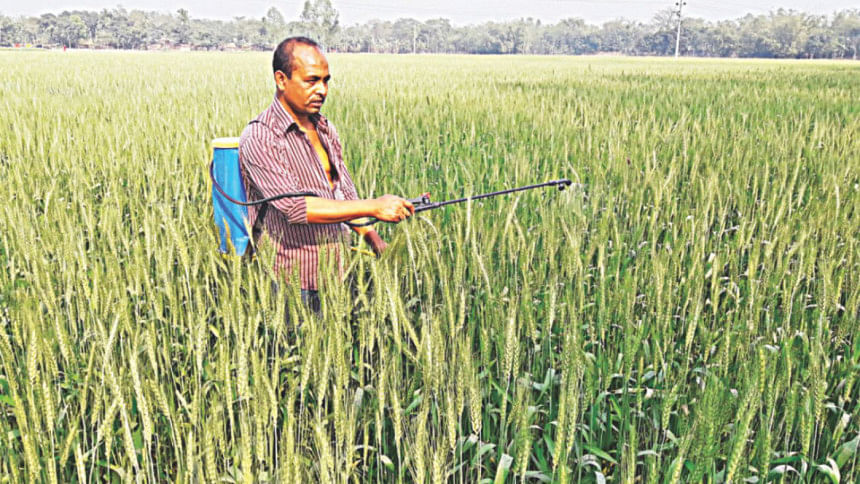Lack of winter worries north's wheat growers

Winters in Thakurgaon and Panchagarh can sometimes be, by Bangladeshi standards, uncomfortably cold. While people might not always enjoy those months of shivering, the winter season is nonetheless quintessential, a predictable part of any year. Thus when a solid winter does not arrive it can be more uncomfortable still, not least for the region's wheat farmers.
This year unseasonal, warm temperatures have left wheat crops attacked by aphids and raised concerns among farmers and scientists that the warmer than usual days will stifle the growth of wheat grain, with harvests thereby undermined.
Although officials of the agriculture extension department claim the situation is under control and wheat production will not be adversely affected, agro-scientists are especially concerned about the impact of the warmer climate on the growth of wheat crops planted after November last year.
Farmers in the two districts have reported to The Daily Star that the growth of wheat sheaves has been far from optimal, with harvest levels likely to be the worst in several years.
“I have wheat on two bighas of land,” says Anikul Barman, 58, of Moidandighi village in Panchagarh's Boda upazila. “The sheaves this year are short in size because the crop did not see much fog this time around, during the growing season.”
“This year's warm weather has been unfavourable for wheat,” says another farmer, Sirajul Islam, 60, of Sakoya village. “February has been hotter than in previous years, which is not good for the crop.”
In addition the warmer weather may have encouraged a rise in aphid numbers. “I plan to spray pesticide on my wheat crop in the next few days,” says grower Rafiqul Islam, 45, from Bhelajan village in Thakurgaon Sadar upazila. “Aphids have attacked my crop, leaving black spots on the sheaves. The pest attack at this time raises concerns as to whether I will be able to achieve a good harvest.”
“Wheat is a winter-loving crop,” says Dr Md Zahidul Islam Sarker, chief scientific officer at the Wheat Research Institute in Dinajpur. “As winter was of short duration this season, grain growth on the crop can be affected. Harvests might be around ten percent lower than expected.”
He notes the moisture associated with winter and fogs is drawn from the soil via the roots of the wheat plant to foster healthy grain growth.
The deputy director of Thakurgaon's Department of Agriculture Extension Maududul Islam meanwhile says aphid attack at this stage of the crop's cycle is unlikely to affect production much. He says temperatures, though warm, have not been hot enough thus far, to seriously hamper production levels.
“Wheat crops will not be affected by temperatures that are below 18 degrees,” he says. One day recently, however, the lowest temperature was 20 degrees Celsius.
The agriculture extension department reports wheat cultivation on 67,820 hectares in Thakurgaon district this season and a further 26,430 hectares in Panchagarh. Production targets for the two districts are 211, 556 and 77, 975 tonnes respectively.


 For all latest news, follow The Daily Star's Google News channel.
For all latest news, follow The Daily Star's Google News channel. 



Comments